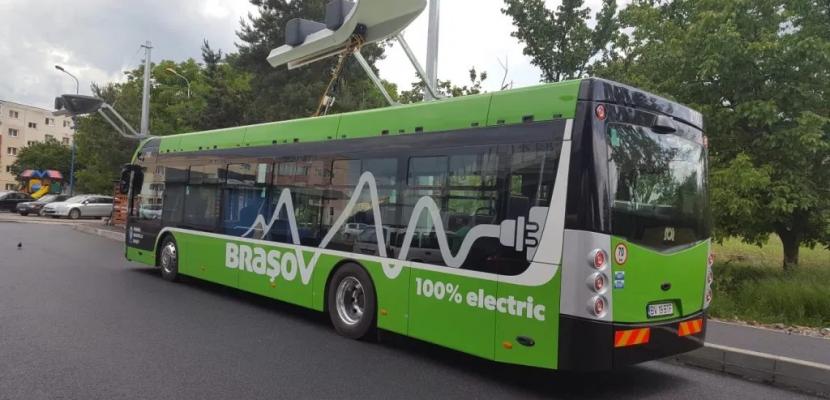Image

Electric public transport networks - battery electric buses
Published on 09 June 2021

Romania
Centru
This is the good practice's implementation level. It can be national, regional or local.
About this good practice
Up to 2018, Brașov City used to operate a bus fleet based on internal combustion engines, where more than 90% of vehicles were EURO4 or less. Implementation, starting with November 2015, when the municipality decided to upgrade the bus fleet to lower carbon footprint.
The municipality purchased 52 electric buses with 80% financing from the Romanian Administration of the Environmental Fund, in two lots, of 42 and 10 buses, respectively. The battery electric buses have replaced an older diesel bus fleet, to provide more reliability and better services.
The 42 buses in the first lot have a length of 12 meters, with 3 double doors each, fully low floor, centrally located electric traction motor (rated power: 160 kW, with braking energy recovery), traction batteries (capacity 263 kWh, minimum range 200 km, minimum service life: 5 years). The 10 buses in the second lot are 8-m long, will have a minimum transport capacity of 50 people of which at least 16 on seats (for 8m buses). The duration of use of electric batteries is at least 5 years and ensures a range of at least 200 km. Electric batteries will allow a fast charge (15-30 minutes) and a slow charge (maximum 6 hours) without losing their functional qualities.
The main stakeholders are the Municipality of Brasov, the Metropolitan Transport Authority of Brasov, RATBv (the public transport operator). Main beneficiaries of the practice are the citizens of Brasov area who benefit from carbon-free public transport system.
The municipality purchased 52 electric buses with 80% financing from the Romanian Administration of the Environmental Fund, in two lots, of 42 and 10 buses, respectively. The battery electric buses have replaced an older diesel bus fleet, to provide more reliability and better services.
The 42 buses in the first lot have a length of 12 meters, with 3 double doors each, fully low floor, centrally located electric traction motor (rated power: 160 kW, with braking energy recovery), traction batteries (capacity 263 kWh, minimum range 200 km, minimum service life: 5 years). The 10 buses in the second lot are 8-m long, will have a minimum transport capacity of 50 people of which at least 16 on seats (for 8m buses). The duration of use of electric batteries is at least 5 years and ensures a range of at least 200 km. Electric batteries will allow a fast charge (15-30 minutes) and a slow charge (maximum 6 hours) without losing their functional qualities.
The main stakeholders are the Municipality of Brasov, the Metropolitan Transport Authority of Brasov, RATBv (the public transport operator). Main beneficiaries of the practice are the citizens of Brasov area who benefit from carbon-free public transport system.
Resources needed
-Purchase of battery electric buses: 500.000 EUR/vehicle
-Purchase of public transport management system: 4.12 Mil. EUR
-Construction of charging areas in depot: 1 station/electric bus
-Construction of charging areas on the route: 1 station/ bus station
-Personnel buses/fleet mgmt.: 22 people
-Purchase of public transport management system: 4.12 Mil. EUR
-Construction of charging areas in depot: 1 station/electric bus
-Construction of charging areas on the route: 1 station/ bus station
-Personnel buses/fleet mgmt.: 22 people
Evidence of success
The newly purchased electric buses have performed, so far, approx. 725,000 km and by replacing the old diesel buses they produced a reduction of polluting emissions of apox. 3587 kg CO, 8541 kg NOx, 1127 kg Hydrocarbons and 171 kg Particles. Similarly, the resulting reduction in the amount of CO2 is 1367 kg. The average energy consumption registered in the first months of operation is low, respectively approx. 1.21 kWh / km.
Potential for learning or transfer
This good practice has a great potential for transfer to other entities, as it is a simple and successful system which public, semi-public or private organizations can adapt to their daily habits. The ambition of the system can vary form a small and pilot project to a great electric motorbikes fleet system, depending of specific conditions.
The battery electric bus system is a viable road transport solution for routes with less predictability, allowing a simple system to modify routes and areas served by this kind of vehicles.
The battery electric bus system is a viable road transport solution for routes with less predictability, allowing a simple system to modify routes and areas served by this kind of vehicles.
Further information
Website
Good practice owner
You can contact the good practice owner below for more detailed information.
Organisation
Regional Development Agency Centre

Romania
Centru
